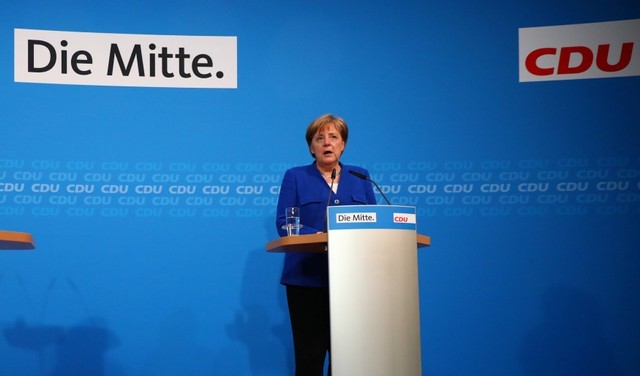
FILE PHOTO: German Chancellor Angela Merkel gives a statement after a meeting with Christian Social Union (CSU) Interior Minister Horst Seehofer at the CDU headquarters in Berlin, Germany, July 2, 2018. REUTERS/Hannibal Hanschke
July 4, 2018
BERLIN (Reuters) – German Chancellor Angela Merkel defended on Wednesday a deal on tightening immigration controls from attacks directed by both her Social Democrat coalition partners and the far-right opposition.
The left criticized Merkel’s plan, sealed at the weekend with her Bavarian conservative allies, as being too draconian while the anti-immigration Alternative for Germany (AfD) party called on Merkel to resign, denouncing it as too soft and vague.
Migrant arrivals peaked in 2015 at more than a million people, many of them fleeing the Syrian war and therefore entitled to asylum, while others were trying to escape poverty.
Numbers have since dropped sharply but Merkel told parliament that Germans had to be reassured. “Order must be brought to all forms of migration so people have the impression that law and order is being implemented,” she said to applause for her own lawmakers but jeers from the AfD.
Merkel offered the chance for people seeking a better life, including Africans, to contribute to German society too.
“There must be legal possibilities for study and work,” she said. “We need a law on immigration for skilled workers so we can create a win-win situation. Otherwise we won’t be able to combat the people traffickers.”
Merkel averted a resignation by Interior Minister Horst Seehofer, who leads the Bavarian Christian Social Union (CSU), by agreeing a system of transit centers on the German border. From there, migrants already registered elsewhere in the European Union and not entitled to settle in Germany could be deported.
The agreement, aimed at settling a row that threatens to topple her three-month old government, has disconcerted some Social Democrats (SPD) who fear for the migrants’ civil liberties.
The center-left party, which must back the plan for it to go ahead, wants to avoid creating the impression that the transit centers will amount to internment centers for refugees.
“We reject mass camps,” wrote SPD Foreign Minister Heiko Maas in a Tweet. “We need a humanitarian and realistic migration policy.”
Talks between the three awkward coalition partners continue, and it may yet prove hard to reconcile Seehofer’s CSU, which faces a strong AfD challenge in Bavarian elections in October, with the Social Democrats’ more dovish line.
AfD co-leader Alice Weidel, issuing her demand for Merkel to quit, dismissed the deal as a “bundle of commonplaces that they want to sell to us as a European solution”.
German officials are laying the groundwork for the deals they will also need to reach with neighboring countries to return migrants if the plan is to have any chance of working.
On Thursday, Seehofer is due to visit Austrian Chancellor Sebastian Kurz, while Hungarian Prime Minister Viktor Orban, another outspoken critic of Merkel’s hitherto open-doors immigration policy, is due in Berlin.
(Reporting by Thomas Escritt; Editing by Michael Nienaber)

